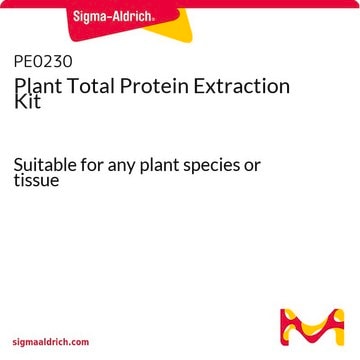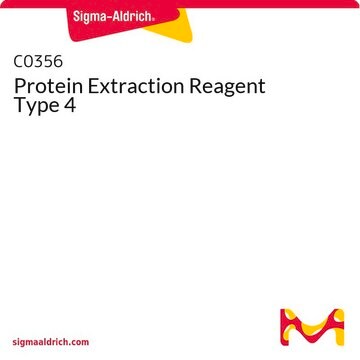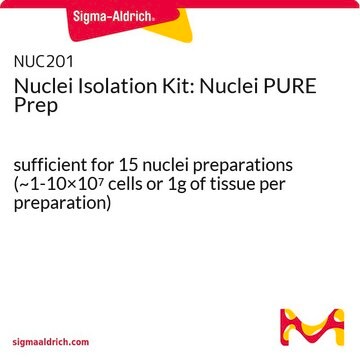PE0240
Plant Fractionated Protein Extraction Kit
Suitable for any plant species or tissue
About This Item
Doporučené produkty
usage
sufficient for 20 extractions
storage temp.
−20°C
General description
Following removal of polyphenolics, tannins and other interfering substances, ground plant tissue, fresh or frozen, is resuspended in a specially formulated reagent to extract hydrophilic proteins. After sequential extractions of hydrophilic proteins, addition of the chaotropic reagent provided extracts hydrophobic membrane bound proteins. Plant debris is pelleted by centrifugation and protein extract solutions are collected. The end results are qualitative fractionated protein samples, ready for downstream proteomic analysis.
Součásti soupravy, které jsou dostupné také samostatně
- Plant Protein Extraction Reagent Type 1 1 bottle
- C0356Protein Extraction Reagent Type 4 1 bottleBezpečností list
- P9599Protease Inhibitor Cocktail, for plant cell and tissue extracts, DMSO solution 3 x 1Bezpečností list
- T7567Tributylphosphine solution, 200 mM (in N-methyl-2-pyrrolidinone), liquid 3 x 0.5Bezpečností list
- A3221Iodoacetamide, Single use vial of 56 mg 3 vial(s)Bezpečností list
signalword
Danger
Hazard Classifications
Acute Tox. 3 Oral - Aquatic Chronic 2 - Carc. 2 - Eye Dam. 1 - Repr. 1B - Resp. Sens. 1 - Skin Corr. 1A - Skin Sens. 1 - STOT SE 3
target_organs
Respiratory system
Storage Class
6.1C - Combustible acute toxic Cat.3 / toxic compounds or compounds which causing chronic effects
Osvědčení o analýze (COA)
Vyhledejte osvědčení Osvědčení o analýze (COA) zadáním čísla šarže/dávky těchto produktů. Čísla šarže a dávky lze nalézt na štítku produktu za slovy „Lot“ nebo „Batch“.
Již tento produkt vlastníte?
Dokumenty související s produkty, které jste v minulosti zakoupili, byly za účelem usnadnění shromážděny ve vaší Knihovně dokumentů.
Zákazníci si také prohlíželi
Náš tým vědeckých pracovníků má zkušenosti ve všech oblastech výzkumu, včetně přírodních věd, materiálových věd, chemické syntézy, chromatografie, analytiky a mnoha dalších..
Obraťte se na technický servis.














